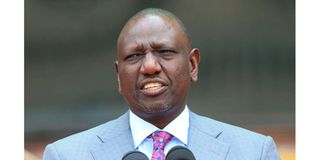Ruto wanted to lead Kenya since he was in class four

President William Ruto.
President William Ruto’s childhood dream of becoming Kenya’s President has come to pass after he took the oath of office.
Unbeknown to many, when he was in class four at Kerotet Primary School, Eldoret North, Uasin Gishu County, Dr Ruto had jokingly told his family members that he would one day rise to become Kenya’s President because he admired President Daniel Moi.
The dream has come true after he was sworn in as Kenya's fifth President, succeeding President Uhuru Kenyatta, in a political first in Kenya’s history.
Dr Ruto has his mother, Mrs Sarah Cheruiyot, to thank for the influence she had on his life, instilling discipline, hard work and strong Christian values.
His mother’s effect on him was later to come in handy in politics, as he brought down barriers and became a stickler for punctuality, appearing at functions at the appointed time, way ahead of his hosts.
Mr Paul Maritim, the President’s cousin, told the Nation in an earlier interview that even at his tender age, Dr Ruto always dreamed of becoming a politician.
As the family took breakfast one morning in Kamagut village, Eldoret West, Dr Ruto, in what sounded like a child’s joke, asked the family how they would feel if one day he rose to become President of Kenya.
“What would you feel if one day, I rose to be a big man like President Daniel Moi?” Dr Ruto asked family members in the room, according to Mr Maritim, suggesting the President’s fascination as a child with the pomp and colour associated with President Moi at public functions.
Mr Maritim said the family dismissed the issue and asked the young man to focus on his education, and no one paid any attention or referred to it until he announced his quest for the presidency in 2012 under the defunct United Republican Party.
“It is important for parents to pay attention to a child’s dream, the fact that we should never underestimate a child’s resolve to succeed and the choice of one’s career path at a young age,” Mr Maritim said.
“(Dr) Ruto is a living example of such resolve. His meteoric rise should serve as a lesson in society that everything is possible despite one’s background and that no dream is too high. Everything is possible.”
Dr Ruto held the Bible at the Kasarani stadium, which was packed to the brim, with tens of thousands watching around the world, to take the oath of office beside his wife Rachel and as his mother watched from the VIP dais, having defied all the odds to rise to the epitome of national, regional and global politics.
Dr Ruto gave up his presidential ambitions in 2012 to team up with Mr Kenyatta, who was then the TNA leader, in the race to succeed President Mwai Kibaki in the 2013 General Election.
Mr Kenyatta ran for President and Dr Ruto as his deputy, and they won against Mr Odinga, who flew the Orange Democratic Movement (ODM) flag, and Ms Martha Karua of Narc Kenya.
They also ran as an item and won the 2017 presidential election under Jubilee (formed following the collapsing of TNA and URP) against Mr Odinga, who ran under the Nasa coalition.
This year, Dr Ruto beat the combined force of Mr Odinga, the Azimio presidential candidate, and Ms Karua as his running mate, even with the backing of President Kenyatta.
President Ruto was one of the blue-eyed boys of President Moi’s regime before he fell out with his mentor.
He later linked up and enjoyed a good rapport with President Moi, who propped him up in politics.
Dr Ruto was a member of Youth for Kanu ’92 along with chairman Cyrus Jirongo, losing favour with the powers that be.
But Dr Ruto still found relevance and favour in the corridors of power, State House and Kanu leadership, helping him build a political career and clinch business deals.
He defied the odds in the 1997 General Election to clinch the Eldoret North parliamentary seat against powerful politicians Rueben Chesire and William Morogo Saina.
Dr Ruto has not lost an election since and has made history as the first politician in Kenya to win the presidency in his first attempt and the first Deputy President to succeed his boss at State House, Kenya’s apex seat of power.
Paradoxically, in this year’s General Election, President Ruto appeared to go flat out to end the reign of Moi’s family in politics with the defeat of Kanu chairman and Baringo Senator Gideon Moi by UDA’s William Cheptumo (former Baringo North MP) in the August 9 polls.
Dr Ruto, as President-elect, sent a high-powered delegation led by Deputy President Rigathi Gachagua to Rongai constituency in Nakuru to campaign for former MCA Paul Chebor against Kanu’s Raymond Moi, Mzee Moi’s eldest son, for the parliamentary seat.
Mr Chebor ended Mr Moi’s bid to be re-elected for a third consecutive term. In effect, it ended the Mois five-decade political reign.
Ironically, President Kenyatta’s family and those of Kibaki, Mzee Moi and all former vice-presidents Joseph Murumbi, Jaramogi Odinga, Dr Josephat Karanja, George Saitoti, Kalonzo Musyoka, Moody Awori and Kijana Wamalwa do not have a representative in elective politics following this year’s General Election.
Mr Musalia Mudavadi, a former vice-president and the Amani National Congress (ANC) party leader, is the only one who seems to have relevance after this year’s election as a Kenya Kwanza leader and is expected to be appointed to a plum Cabinet post.
The swearing-in ceremony was beamed around the world, catapulting Dr Ruto to the global leadership scene, intermittently interrupting the international press’ coverage of the death of Britain’s Queen Elizabeth II.
Some 70 years ago, as a princess, Elizabeth, while on holiday in Kenya, learnt that she had ascended to the throne and would henceforth be Queen at the age of 25 following the death of her father, King George VI in 1952.





